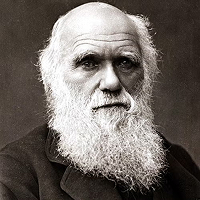Quotes By Charles Darwin

Naturalist And Geologist
Charles Darwin
Feb 12, 1809 - Apr 19, 1882
We must, however, acknowledge, as it seems to me, that man with all his noble qualities... still bears in his bodily frame the indelible stamp of his lowly origin.
False facts are highly injurious to the progress of science, for they often endure long; but false views, if supported by some evidence, do little harm, for every one takes a salutary pleasure in proving their falseness.
I have called this principle, by which each slight variation, if useful, is preserved, by the term of Natural Selection.
Intelligence is based on how efficient a species became at doing the things they need to survive.
Blushing is the most peculiar and most human of all expressions.
But I am very poorly today & very stupid & I hate everybody & everything. One lives only to make blunders.
One general law, leading to the advancement of all organic beings, namely, multiply, vary, let the strongest live and the weakest die.
Man selects only for his own good: Nature only for that of the being which she tends.
If it could be demonstrated that any complex organ existed, which could not possibly have been formed by numerous, successive, slight modifications, my theory would absolutely break down. But I can find no such case.
Nothing is easier than to admit in words the truth of the universal struggle for life, or more difficult, at least I have found it so, than constantly to bear this conclusion in mind.
I see no good reasons why the views given in this volume should shock the religious views of anyone.
Man in his arrogance thinks himself a great work, worthy of the interposition of a deity. More humble, and I believe truer, to consider him created from animals.
There is no fundamental difference between man and animals in their ability to feel pleasure and pain, happiness, and misery.
Freedom of thought is best promoted by the gradual illumination of men's minds which follows from the advance of science.
It is always advisable to perceive clearly our ignorance.
We are not here concerned with hopes or fears, only with truth as far as our reason permits us to discover it.
We are always slow in admitting any great change of which we do not see the intermediate steps.
The loss of these tastes [for poetry and music] is a loss of happiness, and may possibly be injurious to the intellect, and more probably to the moral character, by enfeebling the emotional part of our nature.
Popular Authors










